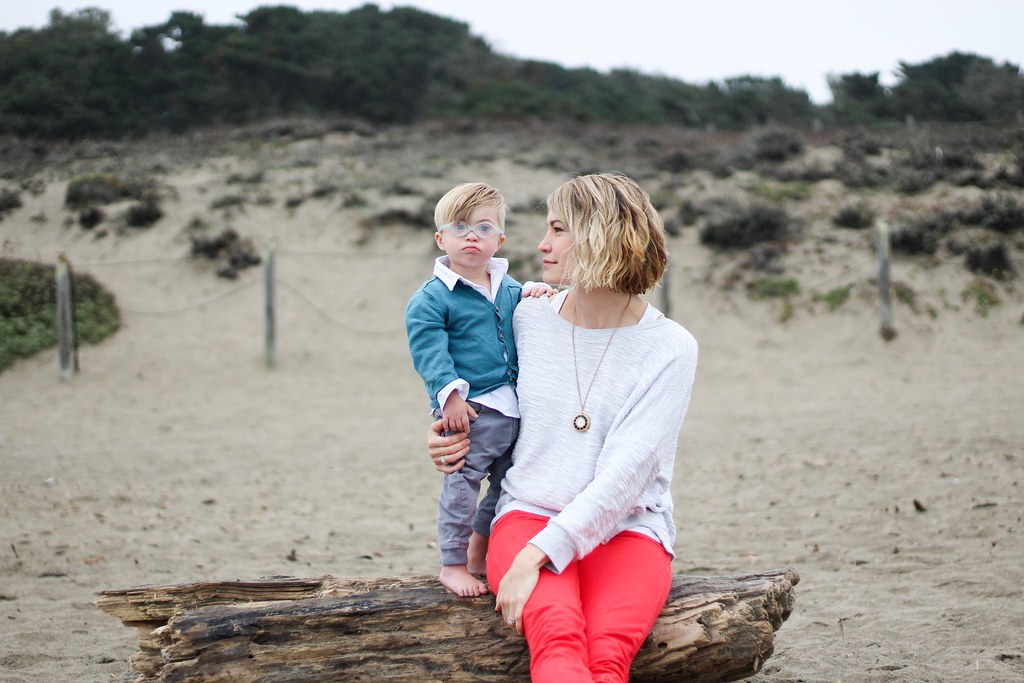Four years ago I wrote the foreword to Micha Boyett’s first book Found: A Story of Questions, Grace and Everyday Prayer, her story of rediscovering prayer in the chaos of motherhood. “The moments all matter,” I wrote of her book. “The daily awareness of the small adds up to the whole of your life, stirring you to wake and walk.” When she wrote Found she was learning how to live prayerfully, how to notice the smallness of God’s presence in her ordinary life. And since that book? Since then she has entered into a story that has called her deeper and deeper into that miraculous ordinary. Her son Ace was born with Down syndrome in 2015, leading her to new places of quiet and joy and transformation. I read her words and my breathing slows. She gives perspective. And hope. It’s a grace to welcome Micha to the farm’s front porch today…
Four out of seven nights a week Ace chooses Maybe God is Like That Too for his bedtime story.
He digs through the haphazard pile of books in his basket of favorites, carries it over to me, and we both plop ourselves belly first onto the carpet. It’s our preferred way of nighttime reading, a habit developed over hundreds of evenings doing this very thing.
The paper pages have been torn and taped together with shiny packing tape, which means our fingers slide across the page when we count the “ten yellow taxis” and point to the tiny dog dressed in a “fluffy purple sweater.”
It’s a simple book, a story of a little boy and his grandma who look for God in an ordinary day, and find God’s presence in the places where they experience simple joy, peace, and goodness.
The boy notices the kindness of strangers and the delight of swinging high into the air at recess and wonders, “maybe God is like that too.” When we get to the “too,” I wait and turn my head with a smile to my three and a half year old. He concentrates and forces out a “tah!” I smile again and say “tah-ooo, tah-ooo.” He tries again, says “tah” and this time makes the “oh” shape with his lips, but no sound comes out. He claps for himself.
This weekend I’ll join two other moms of children with Down syndrome at a conference to share about what we know now, years into our journeys with Down syndrome, what we would love to go back and tell our fearful, younger selves.
I’d say this to myself: God will use your son to refashion your heart, slow you down, reveal what is most real in this life.
When God reveals the realest truth we’re asked to change the way we live in this world.
When Ace was given to me, he shook my vision of everything.
Suddenly what I’d always accepted about success, intelligence or ability became categories that deprived my child of value.





I spent my early years of motherhood wanting to believe that I would accept my kids no matter their ability or impressiveness. But I breathed out relief when my older sons learned to speak early, when they grew fast, and when they were labeled bright or learned to read faster than others.
It was having a child who would never fit into labels of “bright” or would not win the race of early readers, to consider that my priorities might have been misplaced all along.
I had always used words that championed every human as valuable, but in truth I judged my parenting based on whether my children were successful, polite, and kind. I judged my own value based on those standards as well.
“My yoke is easy and my burden is light,” Jesus is always saying. “Take my yoke upon you.”
What I didn’t expect was that my third baby, the child who came into this world weaker, his chromosomal differences written into every cell of his body, would be my teacher in the yoke of Jesus.
I used to think that Jesus’ easy burden was something to learn.
Learn to release the anxieties of my life.
Learn to live in a lighter way.
Now I recognize that the ease of Jesus is not something I have to find my way toward. It’s here with me already. It’s beside me if I choose to turn and see it.
We live in the city where school drop-offs involve complicated searches for parking spaces along the streets close by. Ace and I find a spot, walk the blocks, wait for the crosswalk lights. He holds my hand and then lets go when we get to the sidewalk. “Tah, tah, tah!” he counts. “Doh!” And then he runs ten paces and stops, grins mischievously at me, and counts to three again. Easy yoke.
If Ace has a superpower it’s his natural inclination to take his time. Despite his living in a culture that needs us all to hurry, Ace has an inner stillness, a willingness to move through the world slow enough to notice the beauty beside him.
That slow movement has provided him with an invisible antenna to see the emotional pain of others.
He seems to turn his attention to feelings of the people around him, not because he’s a prodigy of empathy, but because he lets himself pay attention to the world around him.
Ace is teaching me that moving slowly through the world is the sweetest way to notice, to practice gratitude, to follow Jesus.
We’ve been reading Maybe God is Like That Too for more than a year, saying the “tah” sound of “too” for more than a year. And my son is learning, he’s learning. At a pace I never expected. A pace I’ve learned to release. A pace he celebrates and has taught me to celebrate too.
Yesterday I entered Ace’s room during the chaos of helping his brothers finish their after-school homework, and gathering ingredients for dinner. And I found my youngest sitting on the floor listening to music, his doll wiggling back and forth in his hands, dancing to the song he was humming.
How many times did my older boys play pretend or hum? Did I ever really pay attention? This child has never hummed. He has loved music all of his life, but is only just learning the possibilities of his own beautiful voice. And he has never played pretend without my showing him what to do. But, there, right in the middle of the chaos of an ordinary Wednesday, my son was humming and moving his doll to the music.
The miracle of Ace’s life is the miracle available to all of us. It’s the invitation to notice.
It’s the reality that the most wonderful things are not the successes of the powerful, but the presence of God in the smallest everyday gifts.This world says the blessed ones are the multitaskers, the big deal makers, the early learners, the loudest talkers.
The world says the powerful will always win, the rich will inherit the earth, the intellectually impressive will earn respect.
Ace is teaching me the secret of God’s kingdom. It does not look like the world.
It looks like this:
The ones who hug freely will bring peace.
The delighted will notice the miracles.
Those who take their time will find enough.
Those who dance freely will hear music in everything.
The pure in heart will see God.
It’s not anything new. But a reminder that Ace offers me everyday.
Sometimes the task of the Jesus-follower is a lot more simple than we realize.
Sometimes we are called to slow our pace down, take delight in the small moments, look in the eyes of the people who come near —
and recognize that God is inviting us to a life of lightness and ease:
the success of ordinary joy.
Micha Boyett is the author of Found: A Story Questions, Grace, and Everyday Prayer and one of the hosts of The Lucky Few Podcast, which celebrates the lives of people with Down syndrome. She shares her life with Ace at @acefaceismyfriend on Instagram.
In addition to her advocacy for Down syndrome, she writes about ancient spiritual practices and how they inform the contemporary life of faith. She has written for The Washington Post, Christianity Today, Patheos, and various other publications.
I read Micha’s words in Found: A Story Questions, Grace, and Everyday Prayer and my breathing slows. She gives perspective. And hope. And a refreshing lightness to not take what doesn’t matter too seriously. The daily awareness of the small add up to the whole of your life, and her words are one of the most beautiful, memorable reads, like a dawn, stirring you to wake and walk.














